Coriolanus Blu-ray Movie
HomeCoriolanus Blu-ray Movie 
Blu-ray + DVDStarz / Anchor Bay | 2011 | 123 min | Rated R | May 29, 2012

Movie rating
6.6 | / 10 |
Blu-ray rating
| Users | 3.3 | |
| Reviewer | 4.5 | |
| Overall | 4.3 |
Overview
Coriolanus (2011)
Caius Martius 'Coriolanus', a revered and feared Roman General is at odds with the city of Rome and his fellow citizens. Pushed by his controlling and ambitious mother Volumnia to seek the exalted and powerful position of Consul, he is loath to ingratiate himself with the masses whose votes he needs in order to secure the office. When the public refuses to support him, Coriolanus's anger prompts a riot that culminates in his expulsion from Rome. The banished hero then allies himself with his sworn enemy Tullus Aufidius to take his revenge on the city.
Starring: Gerard Butler, Ralph Fiennes, Brian Cox, Jessica Chastain, Vanessa RedgraveDirector: Ralph Fiennes
| Drama | Uncertain |
| War | Uncertain |
| Thriller | Uncertain |
Specifications
Video
Video codec: MPEG-4 AVC
Video resolution: 1080p
Aspect ratio: 2.35:1
Original aspect ratio: 2.39:1
Audio
English: DTS-HD Master Audio 5.1 (48kHz, 24-bit)
Subtitles
English SDH, Spanish
Discs
25GB Blu-ray Disc
Two-disc set (1 BD, 1 DVD)
DVD copy
Playback
Region A (locked)
Review
Rating summary
| Movie | 5.0 | |
| Video | 4.5 | |
| Audio | 4.5 | |
| Extras | 4.0 | |
| Overall | 4.5 |
Coriolanus Blu-ray Movie Review
Tragic Man of War
Reviewed by Michael Reuben May 17, 2012Coriolanus is one of those Shakespeare plays that few people have ever heard of (other than academics), and fewer still have seen performed. None of its characters are iconic figures—unlike, say, Hamlet brooding, Lady Macbeth washing her hands, Romeo and Juliet doomed in their young love or King Lear beset by ungrateful daughters—and its language hasn't permeated common speech like Hamlet and The Tempest. (If you think I'm exaggerating, listen for the next time someone refers to the "mind's eye" -- Hamlet or a "sea change" -- The Tempest.) Coriolanus remains a remote and unpopular work, ignored except by an occasional provocateur like T.S. Eliot, who famously claimed that the play was superior to Hamlet. People listened politely, because Eliot was an eminent poet and critic, but no one agreed. The play's lack of popularity is fitting, because its title character disdains popularity and scorns the public. The irony is that he's devoted his life, and risked it repeatedly, to defending those same people as a soldier. Caius Martius Coriolanus (the last name is an honorary title awarded after a major victory) is Rome's greatest general, but he is only fully at home on the battlefield. His downfall comes when he yields to the entreaties of family and friends to enter politics, for which he has neither the appetite nor the skill. He's a difficult character to portray, because he's a man of action not words, and he does as little to curry favor with an audience as with the Roman populace. Shakespeare didn't give Coriolanus any introspective soliloquies or light-hearted scenes with friends or family, where he shows another side of himself. "Make you a sword of me!" he yells to his men as he leads them into battle, and the image sums up his entire character. He is always and everywhere an unyielding weapon, most useful when hurtling forward toward an enemy. Ralph Fiennes played the part in a British stage production in 2000 and became fascinated with transforming the play into a film, which had never been done previously. Fiennes is the ideal performer for the role. There's a fine line between Coriolanus and a pure villain, and no actor of his generation has demonstrated such subtlety in portraying screen villains, from the casually vicious Nazi commander Amon Goeth (Schindler's List) to the homicidal Francis Dolaryhyde (Red Dragon) to the ruthless gangster Harry (In Bruges) and, of course, the theatrically grandiose Valdemort (assorted Harry Potter films). Fiennes partnered with playwright and screenwriter John Logan (Gladiator, Hugo and The Aviator, among others) to pare down Shakespeare's text to the essential exchanges between characters and reconceive the rest in cinematic terms. Fiennes took on directing duties himself, and he'd obviously been paying attention during many years spent on sets with some of the world's great directors. The result is a thoroughly modern war film populated by the kind of vividly specific characters that could only have come from the greatest playwright in the English language.
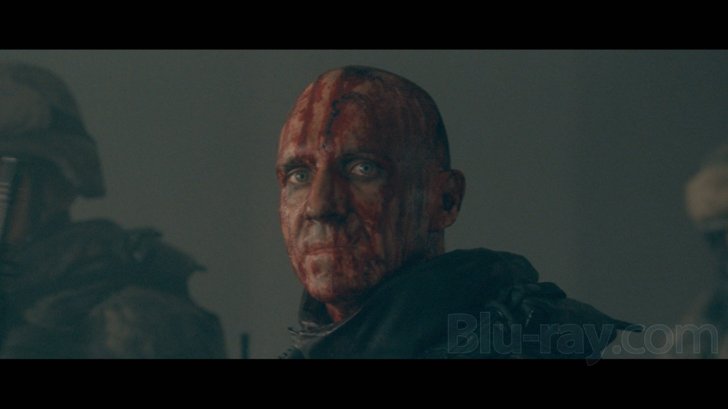
The time is clearly the present. News broadcasts, cellphone cameras and weaponry all reflect current technology. The location is "A Place Calling Itself Rome", and it looks like many troubled urban battle zones seen on news broadcasts, most recently in Cairo and Damascus. (The film was shot in Belgrade, Serbia.) The citizens blame the government for a food shortage, and they will not be dissuaded by the televised reassurances of a government official, Senator Menenius (Brian Cox). A public demonstration led by an activist group is treated with contempt by General Martius (Fiennes) and quickly suppressed by riot police. The government's attention is directed elsewhere. An old border dispute has flared with the Volscians, led by Tullus Aufidius (Gerard Butler). As proof of his resolve, Aufidius sends the Romans a webcast of him executing a captured Roman soldier. Martius and Aufidius are old and bitter enemies, and Martius is only too eager to lead the Roman army in a counterattack to repel the Volscians. After a bloody street battle that recalls Sarajevo or Beirut, the Volscians are defeated, and Martius returns home, with even more battle scars added to the already substantial number on his body. For his service, he receives the honorary title "Coriolanus" (after the town where he defeated Aufidius). Despite his distaste for common folk, Coriolanus is urged by Menenius to seek the office of Consul. More importantly, his mother, Volumnia (Vanessa Redgrave), agrees. A patrician, patriotic and ambitious woman, Volumnia wishes to see her son gather as much honor and glory as possible. She values these more than life itself. When Coriolanus' wife, Virgilia (Jessica Chastain), asks how her mother-in-law would have borne it if her son had died fighting the Volscians, Volumnia replies with eerie composure: "Then his good report should have been my son." Virgilia, who has her own child (Harry Fenn) to worry about, doesn't share this sentiment. Reluctantly, Coriolanus agrees to seek the Consul's office, but he is opposed by two Roman tribunes, Brutus and Sicinius (Paul Jesson and James Nesbitt), who scheme to turn the citizens against him. Their task proves to be an easy one, given Coriolanus' prickly temperament—so easy, in fact, that they're able to work the crowd of citizens into a frenzy of baying for the general's banishment. Menenius can do nothing, and Coriolanus is expelled from Rome. On foot and alone, Coriolanus roams the countryside for months. Eventually he arrives at the Volscian capital of Antium. His appearance is so changed that his old foe, Aufidius, doesn't recognize him until Coriolanus identifies himself and describes how he was banished from Rome. Then he offers to join Aufidius so that he can return and exact vengeance on his ungrateful city. Aufidius is so moved that he embraces his former enemy. News of the Volscians' new ally galvanizes their army and terrifies the Roman government. A diplomatic mission by Menenius is fruitless. "Coriolanus has grown from man to dragon", says the elder statesman upon his return. With the city's defenses crumbling before the onslaught of the Volscians under their new commander, the Romans make a desperate plea through Coriolanus' family, sending his mother, wife and young son to beg him for a peace treaty. They ultimately succeed, and the treaty is signed, but Coriolanus can never go home. Nor is he welcome any longer among the Volscians who adopted him. He is truly a soldier without a cause to fight for. By setting Coriolanus in the present, Fiennes and Logan aren't doing something gimmicky, as it often feels when theater companies modernize Shakespeare (or when Baz Luhrman replaced Romeo and Juliet's swords with pistols). Instead, they've found a way to supply the title character with a context that wasn't available in Shakespeare's time by drawing on a century of cinematic associations. The most obvious reference is another professional soldier with a clean-shaven head, Colonel Kurtz, who was equally contemptuous of politics. (In the commentary, Fiennes specifically refers to Apocalypse Now.) But an equally important reference is The Hurt Locker, in which Fiennes appeared, not only for the style of the battle scenes, but also for its notion of war as an addictive drug. This same notion is there as subtext in Shakespeare's play, but Fiennes's performance brings it to the surface. He makes Coriolanus look physically uncomfortable when he's not in battle, like an addict suffering withdrawal. His ill temper and anti-social behavior become expressions of the frustration of a man who only feels fully alive when he's leading a squad of armed men into a fire fight, covered in gore and surrounded by flame, smoke and bullets. And in Coriolanus' contempt for everyone but his fellow soldiers, one can readily hear the echoes of another memorable soldier who believed that ordinary people "can't handle the truth". The only person in his life who truly understands Coriolanus is his mother. Volumnia belongs to the elite group of fierce Shakespearean women that includes Lady Macbeth, King Lear's two elder daughters, Goneril and Regan, Tamora in Titus Andronicus and (depending on the interpretation) Cleopatra. Vanessa Redgrave has said that she didn't think she could play the part, but that it turned out to be a career high point. It's certainly an intimidating portrait of maternal love. Delicately bandaging her son's wounds after the Volscian battle, Volumnia gently but determinedly dismisses his objections, effectively ordering Coriolanus to undertake the political campaign that will prove to be his undoing. The scene is so intimate and intense that, when Coriolanus' own wife enters the room, she feels like an intruder—and leaves.
Coriolanus Blu-ray Movie, Video Quality 
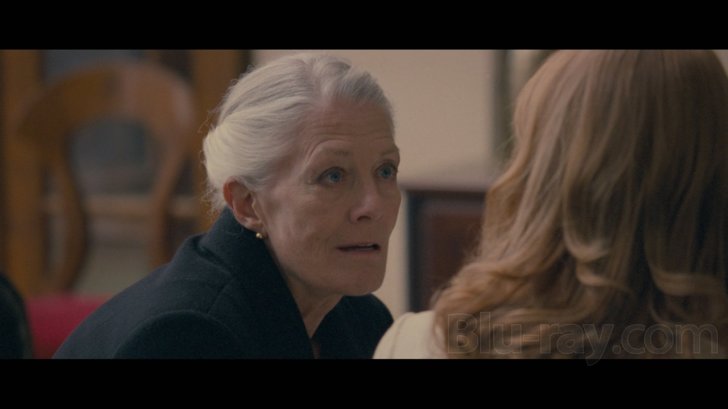
Appropriately enough for a film that echoes so many of The Hurt Locker's themes, Coriolanus also shares its cinematographer, Barry Ackroyd. (His other credits include United 93 and The Green Zone for Paul Greengrass, as well as the recent Contraband.) Ackroyd gives the battle scenes in Coriolanus the same gritty immediacy he supplied for Katherine Bigelow's Oscar winner, but both he and Fiennes are careful to minimize the use of the camera style commonly known as "shaky cam". There's just enough of it to convey the soldier's shifting point of view, but generally the battle effects are achieved by other means, including odd angles, variable speeds and desaturation. The film was completed on a digital intermediate, and Anchor Bay's 1080p, AVC-encoded Blu-ray was presumably sourced from the digital files, thereby providing a faithful rendering of the finished film. Detail is excellent, grain patterns appear natural (to the extent they have survived the DI process), and the filmed sequences have been skillfully blended with the "found" footage culled from news reports (primarily from the war in Kosovo) so that it's often hard to tell what's been faked and what's real. Within the imaginary world of the film, the Serbian locations contribute a strong sense of reality, and the Blu-ray's impressive reproduction of the imagery is essential to the film's impact. Even though the film has numerous kinetic sequences, the lack of any major video extras has allowed Anchor Bay to get away with releasing this two-plus hour film on a BD-25.
Coriolanus Blu-ray Movie, Audio Quality 
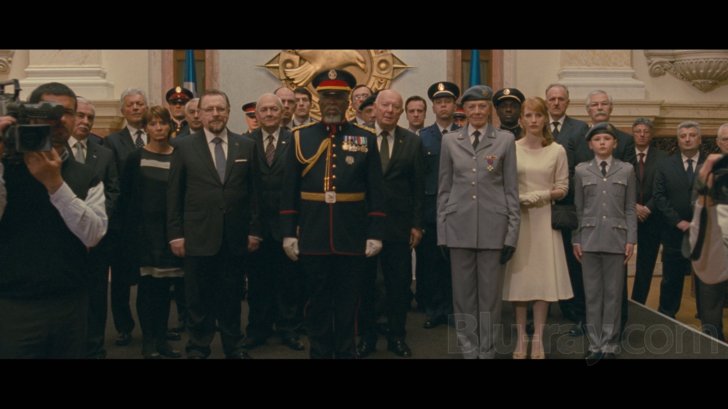
There's a saying that war is good for business, but it's also good for sound designers. Particularly in its opening half hour, the DTS-HD MA 5.1 track of Coriolanus is positively unnerving in its evocation of the hell of an urban firefight, with automatic weapons fire from all sides, explosions, debris and rocket fire. In the Roman sequences, where political intrigues are always brewing, the sound of the crowd that will ultimately banish the general from the city fills the soundfield, sometimes as an ominous murmur, sometimes as a roaring chant of disapproval. A different kind of roar is heard after Coriolanus strikes his alliance with Aufidius and inspires admiration among his men: raucous, boisterous, but also dangerous. The sound design ensures that the viewer is always aware of these forces that are either raining down destruction or on the verge of doing so. Long passages of the film proceed as visual storytelling, without dialogue. However, the mixers have been careful to ensure that the actors are fully audible when they deliver the portions of Shakespeare's text that Logan and Fiennes deemed essential (Fiennes speaks to this point on the commentary). One of the great advantages of Shakespeare on film is that it frees an actor to explore an entire range of volume for delivering the lines. In Coriolanus, Vanessa Redgrave's Volumnia is the chief beneficiary of this technical enhancement, as she explores every nuance of the steely mother's manipulative relationship with her warrior offspring, often speaking the harshest sentiments in a voice barely above a whisper. On the Blu-ray's track, you can hear every word.
Coriolanus Blu-ray Movie, Special Features and Extras 
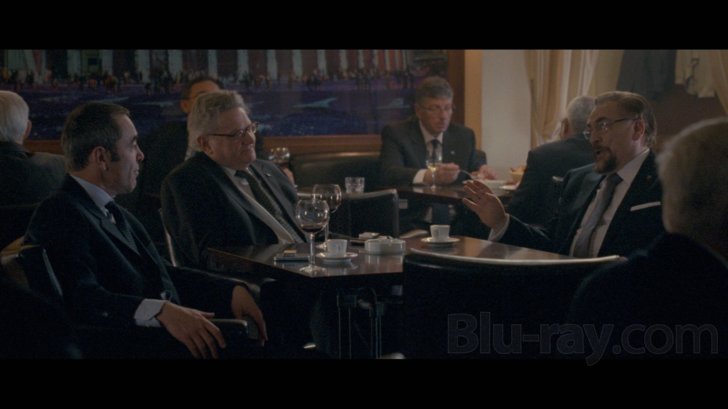
- Commentary by Director/Actor Ralph Fiennes: Fiennes's background as primarily an actor is evident in his consistent focus on the root intent of characters in individual scenes. On a superficial listening, he might appear to be summarizing the action on screen, but in fact he's providing a glimpse into the kind of analysis that allows first-rate classically trained actors to dig beneath the surface of Shakespeare's language to the core of human thought and emotion that guides their performances. It's a big part of what allows performers like Fiennes, Cox and Redgrave to speak Shakespeare's language with such clarity and directness—they've done the hard work of understanding what their characters are thinking as they speak each word. Along the way, Fiennes drops informative tidbits about how screenwriter Logan translated the play into a film, working in the city of Belgrade, the challenges of relocating the play to a contemporary setting, and the differences between stage and screen acting.
- The Making of Coriolanus (SD; 1.78:1, enhanced; 5:38): A better-than-average EPK that includes interviews with Fiennes, Chastain, Cox, Butler, Logan and Redgrave, as well as behind-the-scenes footage.
- Additional Trailers: At startup the disc plays trailers, in standard definition, for My Week with Marilyn, The Iron Lady and The Artist. These can be skipped with the chapter forward button and are not otherwise available once the disc loads.
Coriolanus Blu-ray Movie, Overall Score and Recommendation 
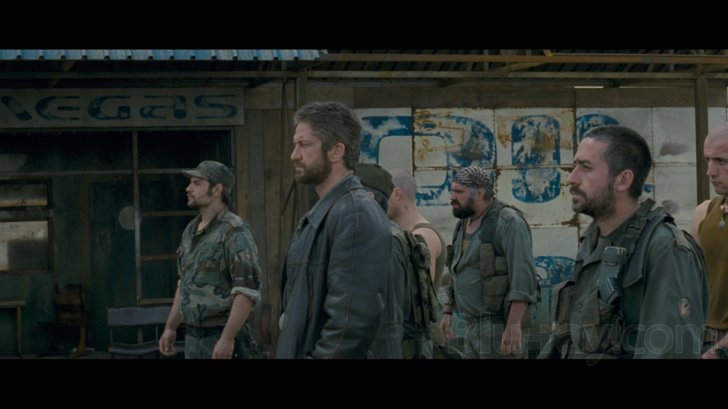
If you're a Shakespeare fan, you should get this Blu-ray, because you're not likely to see a production of Coriolanus anytime soon, and if you do, it probably won't be as effective. If you're a fan of war films, you should get this Blu- ray, because it's a unique and enthralling war film. If you're a fan of fine drama, you should get this Blu-ray, because it features some of the finest actors working today giving great performances. And if you're none of the above, well, you should get this disc anyway, because it's terrific stuff.
Similar titles
Similar titles you might also like

Generation Kill
2008

Stalingrad
1993

Breaker Morant
1980

Fail Safe
1964

Dr. Strangelove or: How I Learned to Stop Worrying and Love the Bomb 4K
1964

Punishment Park
1971

The Green Berets
1968

Paths of Glory
1957

Lions for Lambs
2007

Jarhead
2005

The Manchurian Candidate 4K
20th Anniversary Edition
2004

The Great Dictator
1940

Syriana
2005

The Thin Red Line
1998

Apocalypse Now 4K
Final Cut | 40th Anniversary Edition
1979

Brothers
2009

The Deer Hunter 4K
Collector's Edition
1978

Eye in the Sky
2015

1917 4K
2019

Cross of Iron
1977